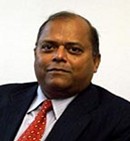|
||||||||||||||
|
Plenary
Lecture
Abstract: Among all modes of transportation, travel
by airplanes and automobiles continues to experience the
fastest growth. Currently, there are approximately
500,000 air vehicles (335,000 Active General Aviation
Aircraft, 18,000 Passenger Aircraft, 90,000 Military
Aircraft, 27,000 Civil Helicopters, and 30,000 Military
Helicopters), and 750 million ground vehicles in service
worldwide. They are responsible for 50% of petroleum
(oil) consumption and 60% of all greenhouse gas (GHG)
emissions worldwide. These numbers are forecasted to
double by 2050. Therefore the environmental issues such
as noise, emissions and fuel burn (consumption), for
both airplane and ground vehicles, have become important
for energy and environmental sustainability. This paper
provides an overview of specific energy and
environmental issues related to both air and ground
transportation. For air transportation, topics dealing
with noise and emissions mitigation by technological
solutions including new aircraft and engine
designs/technologies, alternative fuels, and materials
as well as examination of aircraft operations logistics
including Air-Traffic Management (ATM), Air-to-Air
Refueling (AAR), Close Formation Flying (CFF), and
tailored arrivals to minimize fuel burn are discussed.
The ground infrastructure for sustainable aviation,
including the concept of ‘Sustainable Green Airport
Design’ is also covered. For ground vehicles, the
technologies related to reduction in energy requirements
such as reducing the vehicle mass by using the high
strength low weight materials and reducing the viscous
drag by active flow control and smoothing the
operational profile, and reducing the contact friction
by special tire materials are discussed along with the
portable energy sources for reducing the GHG emissions
such as low carbon fuels (biofuels), lithium-ion
batteries with high energy density and stability, and
fuel cells. |
|
|||||||||||||
|
|
|
|
||||||||||||
| copyright - designed by WSEAS | ||||||||||||||
